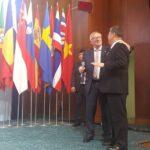Beautiful Plants For Your Interior
SUMMARY OF PLENARY SESSION – BUILDING AN INCLUSIVE ECONOMY MODERATED BY: MR.AMARJARGAL RINCHINNYAM, FORMER PRIME MINISTER, MONGOLIA
Academicians are debating on theoretical aspects such as direct relationship between stability of society, individual freedom and inclusive economic growth.
SUMMARY OF PLENARY SESSION – BUILDING AN INCLUSIVE ECONOMY MODERATED BY: MR.AMARJARGAL RINCHINNYAM, FORMER PRIME MINISTER, MONGOLIA
July 14, 2016
Ladies and Gentlemen’s,
The concept of inclusive growth is “a very big umbrella”, so we were given guidance to keep the discussion within a scope of economic growth, income inequality, corporate social responsibility, citizen participation, multilateral trading system, economic integration between EU and ASEAN, special and differential treatment, landlocked, small and remote island economies.
We had two keynote speakers:
- Bert Hoffman, Country director for China, Mongolia and Korea, east Asia and pacific region, World Bank group – Talked about the changes in composition of growth, productivity slow down in overall and as result – less investment demands despite loosen monetary policy, and very low interest rates. He also mentioned education, R&D, business climate, rapid reduction of poverty as forces, among others, that affecting the inclusive growth.
- Ito Masatoshi, Chair of committee on Asia and Oceania, Keidanren (Japan business federation), Chairman of the board, Ajinomoto co., Inc. stressed an importance of international environment for free and open trade including trilateral relations and cooperation of NorthAmerica, Europe and Asia. He strongly advocated for trans pacific free trade and possible FTA between Japan S.Korea and China. He also mentioned the role of PPP, social and cultural factors for promoting inclusive growth.
Three panelists:
- Rafael Goue, Chairman, consumer finance and non-banking financial institutions, General manager of euracific strategies – highlighted the issue of financial inclusion, in this regard, the role of NGO type of non-banking institutions. The role of communication technology development, big data, strengthening of regulatory framework in order to facilitate the microfinance were also addressed.
- Yolanda Fernandez Lommen, Country director for Mongolia, Asian development bank – saw a weak transport infrastructure as a key factorwhich holds back the inclusive growth, and messaged to look for drivers of growth which do not dependon transport infrastructure, such as services.
- Batsukh Galsan, Chairman of Board of directors, OyuTolgoi llc – highlighted the key challenges for small, landlocked countries. The role of corporate and social responsibility was demonstrated in the case of OT.
During Q&A, there were issues raised on inclusive institutions, SME and interest rate, technology and private sector.
In general, I would say that it was a very lively, provoking session and I want to thankall of speakers, panel , and audiencefor active participation.
Ladies and gentlemen’s,
The concept of inclusive growth is gaining ground in the last few years. Academicians are debating on theoretical aspects such as direct relationship between stability of society, individual freedom and inclusive economic growth. It is more and more clear that land, education, technology, innovation, SME are the key drivers of inclusive growth. Corruption, poverty, unemployment are anti-forces. Fundamental dilemmas of inclusive growth, such as inner vs. outer, economic vs. social, individual vs. community are still in needto be addressed in terms of practical application. I personally do believe that inclusive growth means going far beyond the welfare, it is an interaction of all components in order to create a new synergy. The vision for inclusive growth should be considered in the stages of designing the policy, delivering it, and sharing the output. Inclusive growth is economic growth that creates opportunity for all segments of the population and distributes the dividends of increased prosperity, both in monetary and non-monetary terms, fairly across society.
In practical terms, the expected outcomes of the session were:
- Acknowledge the important role of Asian and European businesses including SMEs, in contributing to the inclusive growth of economy;
- Recognize the untapped potentials in investment and trade between two continents;
- Deliver the message to the business leaders and policy makers to reduce the income inequality;
- Point out the challenges, that landlocked and small remote island economies face;
- How to build inclusive economies, that upgrade the living standards;
In conclusion of the discussions, we recommend to consider following points:
- Ensure that the developing nations’ economic benefits such as unimpeded access and favorable condition for transit countries from political and economic union
- Stress the central role of the wto in setting global trade rules, administering a rules-based multilateral trading system and enhancing the rule of law.
- Welcome the positive outcomes of the tenth wto ministerial conference held in Nairobi in 2015. Advancing negotiations on remaining Doha issues and addressing in the wto the other issues of importance to today’s global economy that would bring significant economic results.
- Create conditions that the corporate social responsibilities of multinational corporations contribute to the community and regional development and assist SMEs;
- Establish stable macro-economic frameworks that encourage and facilitate trade and investments, commit to further liberalization of economies, fight protectionism and refrain from policies that impede free flow of trade and investments;
- Ensure coherence between parallel trade initiatives, work towards the adoption of global standards, as well as promoting the harmonization and mutual recognition of technical regulations and standards in order to prevent regulatory divergences;
- Ensure the respect and effective protection of intellectual property rights at a global level, facilitate business-to-business cooperation and transfer of technology;
- Commit to reinforce joint efforts in fighting infringements of intellectual property rights, including in particular the online counterfeiting and piracy.
- Strengthen dialogues among the civil society, private sector, government and multilateral institutions.
- Ensure transparency and the rule of law in order to prevent and fight corruption.


